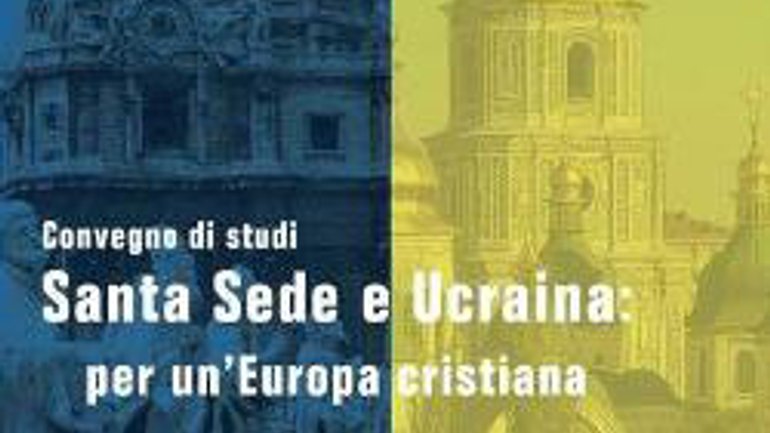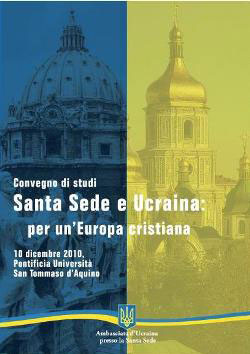Ukraine and the Vatican in the Context of Christian Europe

 On December 10, 2010, at the Papal University of St. Tomas of Aquinas in Rome, an international conference "Ukraine-Vatican in the Context of Christian Europe" was held with the participation of diplomats and representatives of the Roman Curia, the Ukrainian government, the academic world, Ukrainian clergy, and the student community of Rome.
On December 10, 2010, at the Papal University of St. Tomas of Aquinas in Rome, an international conference "Ukraine-Vatican in the Context of Christian Europe" was held with the participation of diplomats and representatives of the Roman Curia, the Ukrainian government, the academic world, Ukrainian clergy, and the student community of Rome.
The event was organized by the Embassy of Ukraine in the Vatican in cooperation with the Department of Social Sciences of the mentioned university and was aimed to review the relations between Ukraine and the Apostolic See and to stress the importance of the preservation by Europe of its Christian roots and to mark the role of Ukraine in that process.
According to Radio Vatican, before the beginning of the conference, the adviser of the Ukrainian Embassy in the Vatican, Dmytro Volovnikov, read a greeting address to the participants of the meeting on behalf of the State Secretary of the Apostolic See, Cardinal Tarcisio Bertone; the head of the Ukrainian Greek Catholic Church, Patriarch Lubomyr (Husar); the head of the Ukrainian Orthodox Church, Metropolitan Volodymyr; and Minister of the Foreign Affairs of Ukraine, Kostiantyn Hryshchenko.
As she was opening the conference, the dean of the Department of Social Sciences of the Papal University, Sister Helen Alford, noted that her institution closely monitors the developments in the post-Soviet space. Earlier, a conference "Countries of the Post-Soviet Space and the Holy See" was held in this context.
Cardinal Leonardo Sandri, the prefect of the Congregation of the Eastern Churches, reported on the history of Christianity in Ukraine, particularly, the period of persecution of the church and its revival after gaining independence. He noted that the great figures of history and culture of Ukraine drew their inspiration from Christianity and that the geographic location of Ukraine at the crossroads of the East and West occasioned the meeting between the Latin and Byzantine Christian traditions, which found their reflection in the society. Cardinal Sandri noted the achievements of Ukraine in the development of the society after the period of totalitarianism and that the international community cannot underestimate the achieved success in the area of reconciliation and overcoming of the regional tensions.
Yurii Bohutskyi, who headed the recently liquidated State Committee on Nationalities and Religions, passed greetings from Ukraine's president and government. In his report, he presented actual statistics reflecting the increase of the number of communities and registered religious organizations. He stressed that the Ukrainian law guarantees equal treatment by the state of religious organizations and observed the positive role played in the society by the All-Ukrainian Council of Churches and Religious Organizations, as well as the social activity of churches. He also pointed to existing problems, particularly, the politicization of religious organizations connected to the fact that the churches enjoy the highest level of trust in the Ukrainian society and that politicians try to abuse it.
The present status of Christianity in Ukraine and challenges faced by the Christian churches in the context of the new evangelization in Europe were discussed at the round table by head of the Conference of the Roman Catholic Bishops in Ukraine, Archbishop Mieczyslav Mokrzytski; Secretary of Bishops of the Ukrainian Greek Catholic Church (UGCC), Bishop Bohdan (Dziurakh); Secretary of the Academic Council of the Kyivan Spiritual Academy and Seminary, who presented a report of the Vicar of Metropolitan Volodymyr and Rector of the Kyiv Spiritual Academy, Archbishop Antonii (Pakanych); and Secretary of the Congregation of the Eastern Churches, Archbishop Vasyl Tsyril, who told the participants about the activity of that institution in relation to the church in Ukraine.









